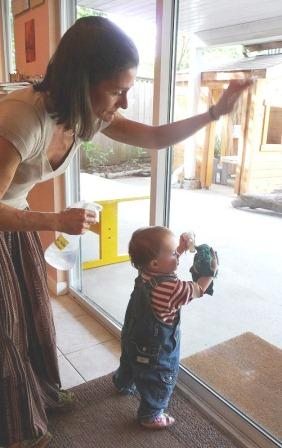When I was in my LifeWays training, Cynthia Aldinger talked about why we feel so good when we clean mindfully, or make a meal from scratch. We did an exercise where we cleaned mindfully, and I could tell that many of us went into it skeptically. But when we came back together at the end, the atmosphere in the room was totally different! I have often thought of that as I do daily tasks with the children, and it makes a real difference in my life.
-Warmly, Faith Collins
Our Invisible Helpers, by Cynthia Aldinger
Have you ever noticed the uplifting feeling that comes after you’ve prepared a meal from scratch, even though you felt that you did not have the time to do it? Or that good feeling that comes after a room or porch has been swept, mopped or vacuumed, after a place has been dusted, after the bed has been made or a room tidied? What is that feeling? One could say it is a sense of satisfaction for a job well done. However, one can feel it even when someone else has done the work. That sens offresh orderliness is like a breath of fresh air for whoever enters the space.
Likely, there are multiple reasons for such feelings. Could one of them be that the activity involved in maintaining a physical space brings about a qualitative change in the mood of the space? If so, how?
There was a time “in olden days” when households recognized that the physical care of the home, the garden, and nature at large, involved special participants that many consider to be whimsical today. Called brownies, tomtens, pixies, gnomes, and many other names, these beings were considered helpers in all processes that involved physical matter. From the book The Spiritual Tasks of the Homemaker by Manfred Schmidt-Brabant, Temple Lodge Press, we read: “In the previous century it was usual in the evenings to put out a bowl of milk for the house spirit—an expression of the homemaker’s belief in invisible helpers.”
Schmidt-Brabant encouraged readers not to attribute human characteristics to such beings, but also not to completely ignore them. For wherever processes are taking place in the material world, there we can have an experience of the activities of these beings. Indeed, we are surrounded by processes in our daily lives that are supported by activities not readily visible to us. Such forces actually lighten our load, especially if we are willing to acknowledge their existence.
With our modern way of thinking, it can be difficult to consider such ideas. In the past it was as much a feeling as it was an intellectual knowing that informed people about such partnerships. Our current abstract, concrete thinking tends to disavow anything that is not tangible. Yet, every day most of us use electricity, cell phones, and computers without any sense of how such power is transmitted across the moles. We also grow vegetables and flower gardens and have ceased t o wonder at how such miracles spring forth from a tiny seed.
As we withdraw further and further from an active partnership with—or at the very least acknowledgement of—these elemental beings, they withdraw their partnership with human beings and the natural world. In the greater scheme of things, we observe such catastrophes as dying forests. But on a smaller scale, we also feel more and more burdened by our daily tasks. What happens if a poet disengages with his muse? The flow of his words becomes more difficult. So it is when we take no interest in the processes that support our work. It can become drudgery.
Schmidt-Brabant indicates that there is one major thing that the elemental world asks of us in return for their help. That is consciousness. They receive nourishment when we think of them with warmth and love—not with sentimentality. So, next time you feel that uplifting feeling after cleaning a room or harvesting your vegetables, take a moment to say, “Thanks for your help.” As Schmidt-Brabant says in his book: “…Elemental beings are like children who dance and are happy if their mothers stroke their hair.”
This article by Cynthia Aldinger was first printed in This Is the Way We Wash-A-Day of the “Children’s Songbook” series, published by Naturally You can Sing Productions. You can find that fabulous song-book with CD here: http://naturallyyoucansing.com/books/washaday.htm. Cynthia Aldinger is a longtime educator and founder of the LifeWays Childcare and Human Development Training.
